全球化的利弊-英语
全球化的利弊英语作文

全球化的利弊英语作文英文回答:Globalization, as a phenomenon, has both its advantages and disadvantages. On one hand, it has brought about increased interconnectedness and interdependence among countries, leading to greater cultural exchange and economic cooperation. This has resulted in the spread of ideas, technology, and products across the globe,benefiting many people in terms of access to new opportunities and resources. For example, the rise of multinational corporations has created job opportunitiesfor people in developing countries, lifting many out of poverty.On the other hand, globalization has also led to the homogenization of cultures and the loss of traditional values and practices. The dominance of Western culture, for instance, has led to the erosion of local traditions and languages in many parts of the world. Moreover, theinterconnectedness of economies has made countries more vulnerable to global economic crises, as seen in the 2008 financial crisis and the current COVID-19 pandemic. This has resulted in widespread job losses and economic instability in many countries.In addition, globalization has also contributed to environmental degradation, as the increased movement of goods and people has led to greater carbon emissions and resource depletion. The pursuit of economic growth and profit has often come at the expense of the environment, leading to issues such as deforestation, pollution, and climate change.中文回答:全球化作为一种现象,既有其优点,也有其缺点。
全球化利弊英语作文
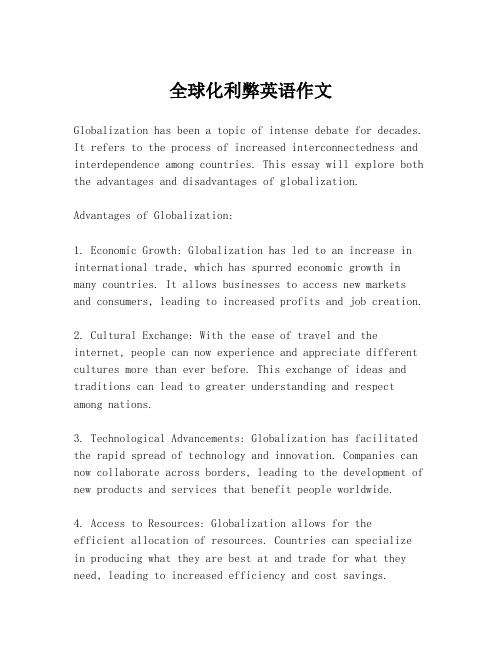
全球化利弊英语作文Globalization has been a topic of intense debate for decades. It refers to the process of increased interconnectedness and interdependence among countries. This essay will explore both the advantages and disadvantages of globalization.Advantages of Globalization:1. Economic Growth: Globalization has led to an increase in international trade, which has spurred economic growth in many countries. It allows businesses to access new markets and consumers, leading to increased profits and job creation.2. Cultural Exchange: With the ease of travel and the internet, people can now experience and appreciate different cultures more than ever before. This exchange of ideas and traditions can lead to greater understanding and respect among nations.3. Technological Advancements: Globalization has facilitated the rapid spread of technology and innovation. Companies can now collaborate across borders, leading to the development of new products and services that benefit people worldwide.4. Access to Resources: Globalization allows for theefficient allocation of resources. Countries can specializein producing what they are best at and trade for what they need, leading to increased efficiency and cost savings.5. Educational Opportunities: Students can now study abroad more easily, gaining exposure to different educational systems and broadening their horizons. This can lead to a more skilled and globally aware workforce.Disadvantages of Globalization:1. Job Displacement: While globalization creates jobs, it can also lead to job losses, particularly in industries that can be outsourced to countries with lower labor costs. This can lead to unemployment and economic instability in certain regions.2. Cultural Homogenization: The spread of global brands and media can lead to a loss of local culture and identity. Some argue that this results in a loss of cultural diversity and uniqueness.3. Environmental Concerns: The increased production and transportation associated with globalization can lead to environmental degradation. Issues such as pollution and climate change are exacerbated by the global scale of industrial activities.4. Economic Inequality: While some benefit greatly from globalization, others are left behind. Wealth disparities can increase, both within and between countries, leading tosocial unrest and dissatisfaction.5. Dependency on Foreign Markets: Countries that rely heavilyon international trade can be vulnerable to economic downturns in other parts of the world. This can lead to economic instability and a lack of self-sufficiency.In conclusion, globalization offers numerous benefits such as economic growth, cultural exchange, and technological advancements. However, it also presents challenges such as job displacement, cultural homogenization, and environmental concerns. It is crucial for policymakers and stakeholders to address these issues to ensure that globalization is sustainable and beneficial for all.。
全球化的利弊英语作文
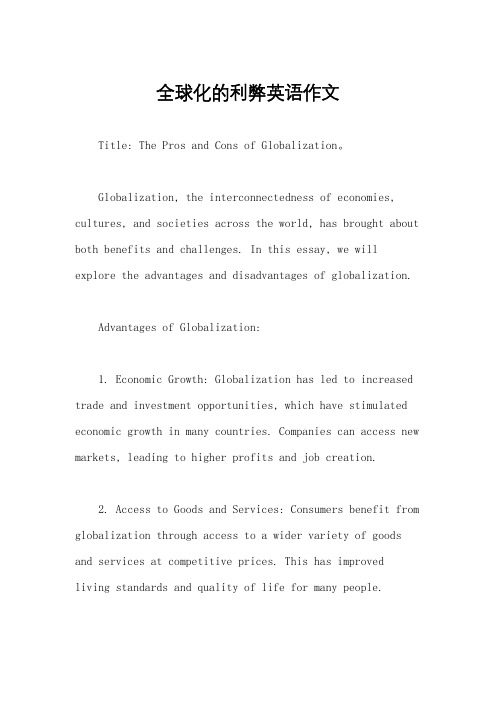
全球化的利弊英语作文Title: The Pros and Cons of Globalization。
Globalization, the interconnectedness of economies, cultures, and societies across the world, has brought about both benefits and challenges. In this essay, we will explore the advantages and disadvantages of globalization.Advantages of Globalization:1. Economic Growth: Globalization has led to increased trade and investment opportunities, which have stimulated economic growth in many countries. Companies can access new markets, leading to higher profits and job creation.2. Access to Goods and Services: Consumers benefit from globalization through access to a wider variety of goods and services at competitive prices. This has improvedliving standards and quality of life for many people.3. Cultural Exchange: Globalization facilitates the exchange of ideas, values, and cultural practices among nations. This cultural diversity enriches societies and promotes understanding and tolerance among people from different backgrounds.4. Technological Advancement: Globalization has spurred innovation and technological advancement by encouraging collaboration and knowledge sharing across borders. This has resulted in improvements in various fields, including healthcare, communication, and transportation.5. Global Cooperation: Global challenges such as climate change, terrorism, and pandemics require international cooperation. Globalization has fostered closer ties between nations, enabling them to work together to address common issues.Disadvantages of Globalization:1. Growing Economic Inequality: While globalization has led to overall economic growth, it has also widened the gapbetween the rich and the poor within and between countries. Some regions and social groups have been left behind, exacerbating poverty and inequality.2. Cultural Homogenization: The spread of global media and consumer culture has led to the erosion of localcultures and traditions. This cultural homogenization can result in the loss of cultural diversity and identity.3. Environmental Degradation: The pursuit of economic growth in a globalized world has often come at the expenseof the environment. Industrialization, deforestation, and pollution have led to environmental degradation and climate change, threatening the planet's sustainability.4. Exploitation of Workers: Globalization has led tothe outsourcing of jobs to countries with lower labor costs, where workers may be exploited and subjected to poorworking conditions. This has raised concerns about labor rights and social justice.5. Vulnerability to Economic Shocks: Interconnectedglobal markets can magnify the impact of economic crises and financial instability. A downturn in one part of the world can quickly spread to others, leading to widespread economic turmoil and hardship.In conclusion, while globalization has brought about significant benefits in terms of economic growth, cultural exchange, and technological advancement, it also poses challenges such as economic inequality, cultural homogenization, environmental degradation, exploitation of workers, and vulnerability to economic shocks. It is essential for policymakers to address these challenges while harnessing the opportunities presented by globalization to create a more inclusive, sustainable, and prosperous world for all.。
全球化优缺点英文版
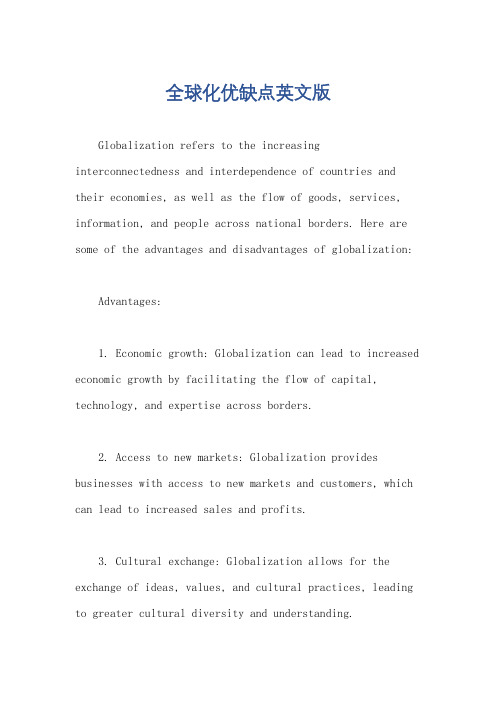
全球化优缺点英文版Globalization refers to the increasing interconnectedness and interdependence of countries and their economies, as well as the flow of goods, services, information, and people across national borders. Here are some of the advantages and disadvantages of globalization:Advantages:1. Economic growth: Globalization can lead to increased economic growth by facilitating the flow of capital, technology, and expertise across borders.2. Access to new markets: Globalization provides businesses with access to new markets and customers, which can lead to increased sales and profits.3. Cultural exchange: Globalization allows for the exchange of ideas, values, and cultural practices, leading to greater cultural diversity and understanding.4. Innovation: Globalization can foster innovation by allowing for the exchange of knowledge and best practices across different countries and industries.Disadvantages:1. Growing inequality: Globalization can exacerbate income inequality within and between countries, as wealth and opportunities may be concentrated in the hands of a few.2. Environmental impact: Globalization can lead to increased environmental degradation due to the expansion of production and consumption, as well as the transportationof goods over long distances.3. Loss of cultural identity: Globalization can lead to the homogenization of cultures, as local traditions and customs may be overshadowed by globalized consumer culture.4. Vulnerability to global shocks: Globalization can make countries more vulnerable to global economic andfinancial shocks, as well as health crises and other global challenges.In conclusion, while globalization has brought about many benefits such as economic growth and cultural exchange, it also presents challenges such as growing inequality and environmental impact. It is important for policymakers and stakeholders to address these challenges in order to ensure that the benefits of globalization are shared moreequitably and sustainably.。
全球化的利弊英语作文
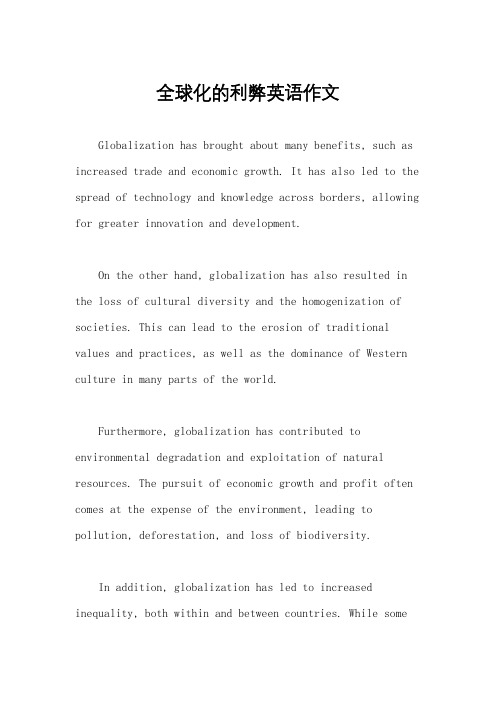
全球化的利弊英语作文Globalization has brought about many benefits, such as increased trade and economic growth. It has also led to the spread of technology and knowledge across borders, allowing for greater innovation and development.On the other hand, globalization has also resulted in the loss of cultural diversity and the homogenization of societies. This can lead to the erosion of traditional values and practices, as well as the dominance of Western culture in many parts of the world.Furthermore, globalization has contributed to environmental degradation and exploitation of natural resources. The pursuit of economic growth and profit often comes at the expense of the environment, leading to pollution, deforestation, and loss of biodiversity.In addition, globalization has led to increased inequality, both within and between countries. While somehave benefited greatly from globalization, many others have been left behind, leading to social unrest and political instability.Moreover, globalization has also contributed to the spread of diseases and pandemics, as people and goods move more freely across borders. This can pose significant challenges for public health and healthcare systems, as well as global security.In conclusion, while globalization has brought about many advantages, it has also resulted in significant drawbacks. It is important for policymakers and leaders to address these issues and work towards a more sustainable and equitable form of globalization.。
全球化的利弊高中英文作文
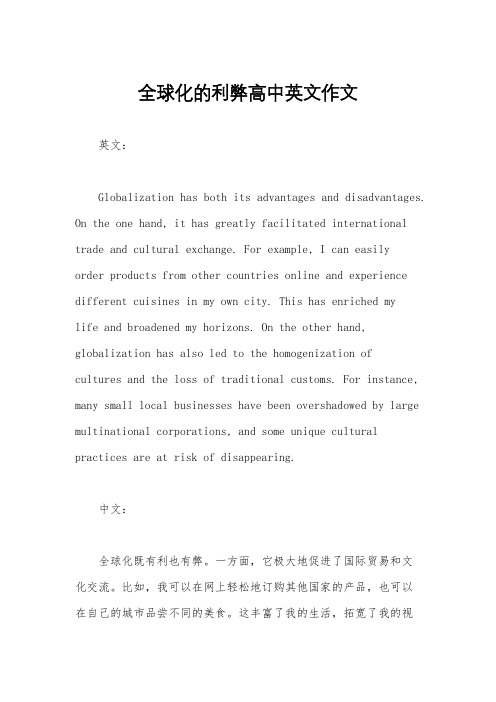
全球化的利弊高中英文作文英文:Globalization has both its advantages and disadvantages. On the one hand, it has greatly facilitated international trade and cultural exchange. For example, I can easilyorder products from other countries online and experience different cuisines in my own city. This has enriched mylife and broadened my horizons. On the other hand, globalization has also led to the homogenization ofcultures and the loss of traditional customs. For instance, many small local businesses have been overshadowed by large multinational corporations, and some unique cultural practices are at risk of disappearing.中文:全球化既有利也有弊。
一方面,它极大地促进了国际贸易和文化交流。
比如,我可以在网上轻松地订购其他国家的产品,也可以在自己的城市品尝不同的美食。
这丰富了我的生活,拓宽了我的视野。
另一方面,全球化也导致了文化同质化和传统习俗的流失。
比如,许多小型的本地企业被大型跨国公司所淹没,一些独特的文化习俗也面临消失的风险。
全球化利弊的英语作文

全球化利弊的英语作文Globalization has both advantages and disadvantages. On one hand, it has brought about economic growth and increased trade between countries. This has led to the creation of new jobs and industries, as well as the availability of a wider range of goods and services for consumers. However, globalization has also resulted in the exploitation of workers in developing countries, as well as the loss of jobs and industries in developed countries.Another benefit of globalization is the sharing of ideas and cultures between countries. This has led to greater understanding and tolerance between different groups of people, as well as the spread of knowledge and technology. However, it has also led to the homogenization of cultures, as Western values and ideals are often seen as the norm.Globalization has also had a significant impact on the environment. While it has led to the development of moresustainable practices and technologies, it has also resulted in increased pollution and the depletion ofnatural resources. In addition, the transportation of goods and people across the world has contributed to the emission of greenhouse gases and climate change.One of the biggest challenges of globalization is the widening income gap between the rich and poor. While some individuals and countries have benefited greatly from globalization, others have been left behind. This has led to social and political unrest, as well as the rise of populist movements.In conclusion, globalization has brought about both positive and negative effects. While it has led to economic growth and the sharing of ideas and cultures, it has also resulted in exploitation, environmental degradation, and social inequality. It is important for policymakers and individuals to consider these factors when making decisions about the future of globalization.。
全球化的利弊总结英语作文
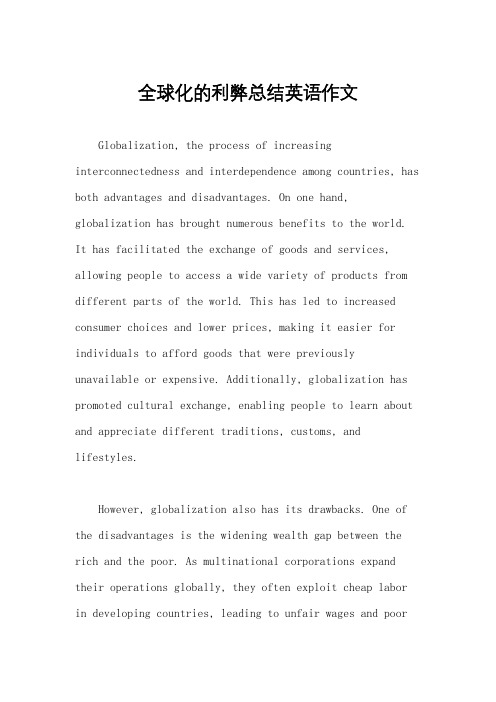
全球化的利弊总结英语作文Globalization, the process of increasing interconnectedness and interdependence among countries, has both advantages and disadvantages. On one hand, globalization has brought numerous benefits to the world. It has facilitated the exchange of goods and services, allowing people to access a wide variety of products from different parts of the world. This has led to increased consumer choices and lower prices, making it easier for individuals to afford goods that were previously unavailable or expensive. Additionally, globalization has promoted cultural exchange, enabling people to learn about and appreciate different traditions, customs, and lifestyles.However, globalization also has its drawbacks. One of the disadvantages is the widening wealth gap between the rich and the poor. As multinational corporations expand their operations globally, they often exploit cheap labor in developing countries, leading to unfair wages and poorworking conditions. This exacerbates income inequality and creates social unrest. Moreover, globalization has resulted in the homogenization of cultures. As Western values and lifestyles dominate the global market, indigenous cultures and traditions are at risk of being eroded. This loss of cultural diversity can lead to a loss of identity and a sense of belonging for many communities.Furthermore, globalization has had negative environmental impacts. The increased movement of goods and people has led to a significant rise in carbon emissions, contributing to climate change. The pursuit of economic growth and profit often takes precedence over environmental sustainability, leading to the depletion of natural resources and the destruction of ecosystems. Additionally, the globalized food system, with its reliance on long-distance transportation, has led to increased carbon emissions and the loss of local food production.In conclusion, globalization has brought both benefits and drawbacks to the world. While it has increased access to goods and services, promoted cultural exchange, andfacilitated economic growth, it has also widened the wealth gap, homogenized cultures, and harmed the environment. It is important for policymakers and individuals to address the negative consequences of globalization while harnessing its potential for positive change.。
- 1、下载文档前请自行甄别文档内容的完整性,平台不提供额外的编辑、内容补充、找答案等附加服务。
- 2、"仅部分预览"的文档,不可在线预览部分如存在完整性等问题,可反馈申请退款(可完整预览的文档不适用该条件!)。
- 3、如文档侵犯您的权益,请联系客服反馈,我们会尽快为您处理(人工客服工作时间:9:00-18:30)。
For the advantages, firstly, because of the various output from different countries, consumers have more chances to enjoy different kinds of goods from other countries, which can improve their quality of life. Secondly, as some countries are lack of some resources, they can benefit from the globalization because they can import the resources which they don’t have or are lack of, such as the labors, technology, raw material and so on. Thirdly, the globalization can promote the development of the international division of labor and cooperation, and it can also be useful for the efficient allocation of resources. What’s more, in the aspect of culture and politics, it can promote people in different countries to communicate with each other, and there would be less conflict in some cultural and political affairs.
For the disadvantages, firstly,Secondly, the globalization intensifies the imbalances of the world economic, especially the imbalances between the developed countries and developing countries. Finally, the globalization also has certain impact on the national culture. Like the economic integration, there is also culture integration, which causes some traditional cultures in certain countries been abandoned by their people. Secondly, I think that the conflict will increase. Globalization gives people more opportunities to communicate with others in other nations, but the huge diversity of religion, race and education still make it hard to get along in harmony.
Thirdly, globalization will increase the possibility of culture hegemony and decrease the cultural diversity. Culture of nations interweaves together by frequent culture exchange. The culture of the nation is very easily influenced by other mainstream culture.
Benefits:
Firstly, globalization can accelerate the spread of the advanced technology so to accelerate the development of the world.
Secondly, developing countries can benefits a lot from the globalization. They can grasp the opportunities to develop their economy relying on the technological and financial aid.
Thirdly, our life will become more convenient we can easily get the goods and product of others countries in the ordinary supermarket.。
